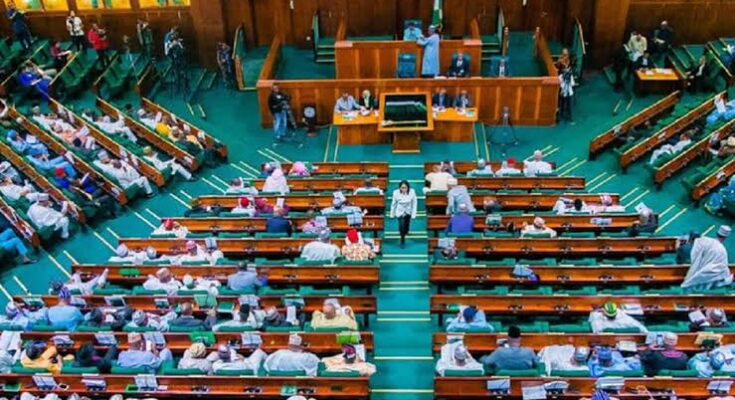The House of Representative on Wednesday received the report/recommendations of its Ad-hoc Committee on the ‘Need to investigate the Petroleum Products Subsidy Regime in Nigeria.
The report which was laid by Hon. Ibrahim Almustapha Aliyu, is expected to be gazetted for consideration by the House Committee on Rules and Business before the 9th Assembly winds down its activities on the 12th June, 2023.

The motion sponsored by Hon. Sergius Ogun (PDP-Edo), was referred to the Ad-hoc Committee on the 29th June, 2022.
Hon. Ogun who led the debate on the motion observed that as of 2002, the NNPC’s purchase of crude oil at international market prices stood at 445,000 barrels per day in order to enable it to provide petroleum products for local consumption.
“The House is concerned that as of 2002, the installed capacity of Nigeria’s local refineries stood at 445,000 barrels per day, however, their capacity utilization began to nosedive and eventually fell completely to zero due to the ineffectiveness and alleged corruption of critical stakeholders in the value chain.
“The House is aware that due to the decline in the production capacity of the refineries, NNPC found it more convenient to export domestic crude in exchange for petroleum products on trade by barter basis described as Direct Sales Direct Purchase (DSDP) arrangement.
“The House is also aware that component costs in the petroleum products subsidy value chain claimed by the NNPC is highly over-bloated while the transfer pump price per litre used by the NNPC in relation to PPMC is underquoted as N123-N128 instead of N162-N165 and this fraudulent under-reporting of N37-N39 per litre translates into over N70 billion a month or 840 billion naira a year.
“The House is worried that the consumption rate of Petroleum Motor Spirit (PMS) is 40 million to 45 million litres per day, however, the NNPC uses 65 million to 100 million litres per day to determine subsidy as discoverable from NNPC’s monthly reports to the Federal Allocation Committee (FAAC).
“The House is also worried that the subsidy regime has been unscrupulously used by the NNPC and other critical stakeholders to subvert the nation’s crude oil revenue to the tune of over US$10 billion, with records showing that as at 2021, over US$7 billion in over 120 million barrels have been so diverted.
“The House is disturbed that there exists evidence that subsidy amounts are being duplicated, thus subsidy is charged against petroleum products sales in the books of NNPC as well as against crude oil revenue in the books of NAPIMS to the tune of over N2 trillion,” Hon. Ogun noted.
Also at plenary, the House concurred with the Senate on the need to establish Real Estate Regulatory Council of Nigeria (RERGN) as part of efforts geared towards ensuring transparency in the industry.
While speaking on the synopsis of the bill, Deputy Majority Leader, Hon. Peter Akpatason explained that the Council, when established, will provide efficient, effective and transparent administration of the business of real estate development.
He said that council is also to prescribe minimum standards for the conduct of the business of real estate development in Nigeria.
According to him, the council, when established is expected to ensure development, sales and lease of plots, apartments, building or any landed property in a transparent manner in the real estate sector
“Provide globally acceptable standards of service and transparent administration of the business of real estate development.
“Prescribe minimum standards for real estate sector, conduct of the business of real estate development in the Federal Capital Territory and for related matters,” he said.
The bill which has 34 clauses was unanimously adopted by the House; it will now be listed for third reading after which it will be transmitted for presidential assent.
READ ALSO FROM NIGERIAN TRIBUNE







